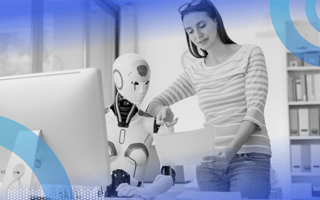The sun hasn’t yet peeked over the horizon when Ava’s AI assistant gently nudges her awake. “Good morning, Ava. Your review meeting is in 30 minutes. I’ve prepared a summary of overnight user feedback and iterated on the UI based on your previous instructions.”
Ava, an employee at a big tech company, still blinking sleep from her eyes, reaches for her tablet. She swipes through the updated mockups and mumbles, “Push the changes to the team repo.”
By 10 a.m., she’s knee-deep in code, her fingers dancing across the keyboard as she pair programs with an AI. Come lunchtime, she’s switching gears, diving into market research for a new product line.
The afternoon blurs by in a flurry of stakeholder meetings, where Ava presents not just mockups, but a fully functional prototype she spun up in hours.
Working With AI
With the way AI is accelerating every part of our work lives, including software development, this future feels inevitable. As AI reshapes our workplaces, are we ready for a future where breadth and cross-functional expertise become the new job requirements? It’s already happening in certain corners of the startup ecosystem, one AI tool at a time. Those building these tools see this transformation clearly. As the founder of Cursor said, “People’s taste and creative ideas will be magnified and it may be less about editing the code ... It’ll be a lot more fun.”
I remember building my first web app at age 17, writing line after line of JavaScript and trying to get some button clicks, images, and basic UI interactions to work, spending days just to build the home page. Fast forward 11 years to last weekend. I came up with an idea for an app that generates an interactive quiz based on any book you have read. The app was ready six hours later. Six hours!
I wrote maybe six lines of code myself. The rest? I got my pal, a new AI-powered IDE, to write it. Sure, I had to give it specific instructions one step at a time, and it helped that I had built software for years so I knew what was going on. Even so, without the AI assistance, my project would have taken several days.
This is not just my story. AI can do the bulk of the programming now for all sorts of use cases. It’s also great at writing a lot of product documentation. It can even do basic data analyses in seconds.
What Can the AI Not Do?
What’s left for humans? The messy, complex, creative stuff. Those aspects of building that require judgment, intuition and the ability to connect dots across domains.
What does that look like in software? Well, let me tell you a quick story. In large companies, UI redesign ideas typically come from designers or product managers, not engineers. But one of the most impactful UI projects that I’ve ever seen came from an engineer. His idea was to change our checkout page from a single page to a multi-page flow. The only reason this idea occurred to him is because I had (almost inadvertently) involved him in a call with our designer in which we were going over customer feedback and UX metrics. Weeks later, when he was figuring out how to reduce tech debt, he connected the dots in his head as he realized that switching to a multi-page flow could both reduce tech debt (engineering win ✅) and improve user experience (product/design win ✅).
This was a one-off incident. But now, we can imagine a world where this kind of breakthrough is a regular occurrence. In a world where AI does code reviews and automates a major share of programming, a natural evolution will be for “engineers” to spend more time learning about customer needs, thinking about system architecture, being involved in product design, managing rollout plans and so on. Basically, engineers will be exploring questions that don’t have a StackOverflow answer.
I used the word “engineer” in quotation marks above because I'm starting to question if the current definition of software engineer (at least in large companies) will even exist in a couple years. In the case of our future tech employee Ava, she split her week between programming sessions, product design work, and talking with stakeholders and customers. Does that make her a product manager or an engineer? Or something entirely new? These roles are evolving. The specific nature of changes is hard to predict. But one thing is becoming clear: The future belongs to polymaths.
A Polymathic Future
Although businesses will always need specialists for cutting-edge tech (like ML researchers developing the next generation of AI models), for most teams, polymathic workers will be the new job requirement.
What Is a Polymath?
The Oxford Dictionary defines a polymath (Greek: πολυμαθής, polymathēs, “having learned much”) as a person whose expertise spans a significant number of different subject areas; such a person is known to draw on complex bodies of knowledge to solve specific problems. The future of work, powered by increasingly smart AI tools, will likely value such polymathic skills and thinking.
This polymathic approach isn’t just about having diverse skills — it’s about connecting the dots across the entire development process. When one person has insight into user research, business metrics, product design and engineering, they can make creative leaps that siloed teams might miss. Like Ava’s workday, going from mockups in the morning to working prototypes by afternoon, our capacity to create has expanded dramatically. But the real magic isn’t merely about speed. It’s about weaving together insights from different domains. About being the architect and the builder, the visionary and the executioner; seeing around corners, thinking across boundaries.





